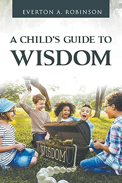
 |
1. To pass on words of wisdom to your children;
2. To provide adults with a tool to teach wisdom to children;
3. To teach children the value of earning money by putting forth an effort to learn wisdom; ..."
The mantra of this small book is wisdom, which is to be taught to children through repetitive lessons, particularly by parents and grandparents. Each chapter names a virtue or quality that a child is to learn, and each is an aspect of wisdom, as the author interprets it. Once the child has mastered the concept through repetition with the parent or grandparent, the child receives a certificate and, perhaps, a monetary reward. Part of the author's message is that the introduction and practice of wisdom throughout childhood can lead to a variety of rewards, and he puts a particular emphasis on material benefits. Children should be encouraged, Robinson feels, through a monetary aspect in the successful acquisition of wisdom in a family setting that is caring and focused.
Robinson acknowledges and is thankful for his belief in God. He is also quick to recognize the help of his family and God in the creation of this book. The philosophies stated by the writer come across clearly in the narrative. For example, Robinson is keenly aware that families are frequently the first and most significant teachers of children. His teaching emphasizes that many children learn well through repetition and that rewards can provide positive reinforcement. The lessons Robinson offers in the chapters are brief and consistent—two aspects that are pedagogically sound practices when instructing young children. The author's process is also clearly presented. Readers searching for some additional advice on how to interact with the children in their lives might wish to check out Robinson’s work.